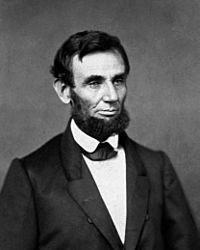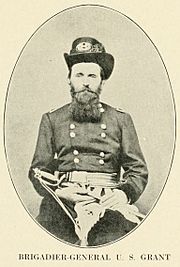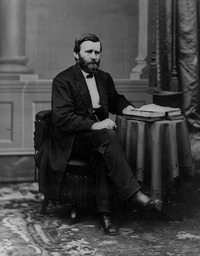Elihu B. Washburne facts for kids
Quick facts for kids
Elihu Washburne
|
|
|---|---|
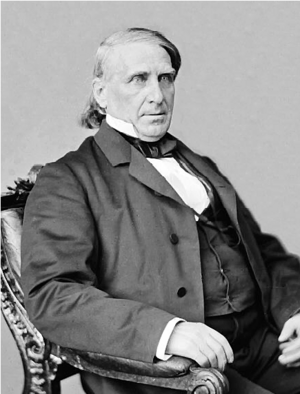
Photograph by Mathew Brady
|
|
| United States Minister to France | |
| In office March 23, 1869 – September 5, 1877 |
|
| President | Ulysses S. Grant Rutherford B. Hayes |
| Preceded by | John Dix |
| Succeeded by | Edward F. Noyes |
| 25th United States Secretary of State | |
| In office March 5, 1869 – March 16, 1869 |
|
| President | Ulysses S. Grant |
| Preceded by | William H. Seward |
| Succeeded by | Hamilton Fish |
| Dean of the United States House of Representatives | |
| In office March 4, 1863 – March 6, 1869 |
|
| Preceded by | John S. Phelps |
| Succeeded by | Henry L. Dawes |
| Member of the U.S. House of Representatives from Illinois |
|
| In office March 4, 1853 – March 6, 1869 |
|
| Preceded by | William Bissell |
| Succeeded by | Horatio C. Burchard |
| Constituency | 1st district (1853–63) 3rd district (1863–69) |
| Personal details | |
| Born |
Elihu Benjamin Washburne
September 23, 1816 Livermore, Massachusetts (now Maine), U.S. |
| Died | October 22, 1887 (aged 71) Chicago, Illinois, U.S. |
| Resting place | Greenwood Cemetery, Galena, Illinois |
| Political party | Whig (Before 1856) Republican (1856–1887) |
| Spouse | Adele Gratiot |
| Children | 7, including Hempstead |
| Education | Maine Wesleyan Seminary Harvard University |
| Signature | |
Elihu Benjamin Washburne (born September 23, 1816 – died October 22, 1887) was an American politician and diplomat. He was part of the important Washburn family, which helped start the Republican Party. Washburne served as a congressman for Illinois before and during the American Civil War.
He was a close friend and political supporter of President Abraham Lincoln and General Ulysses S. Grant. Later, during Grant's time as president, Washburne briefly served as the 25th United States Secretary of State in 1869. He then became the United States Minister to France from 1869 to 1877.
When he was young, Washburne's family faced financial hardship. At age 14, he left home in Maine to support himself and continue his education. He worked for newspapers and studied law. After becoming a lawyer, he moved to Galena, Illinois, and joined a successful law firm.
Washburne was elected to the U.S. House of Representatives in 1852. He served from 1853 to 1869, covering the Civil War and the start of Reconstruction. He strongly supported Lincoln's war efforts. Washburne also helped a rising military leader, Ulysses S. Grant, who had moved to Galena. Washburne supported Grant's promotions in the Union Army and defended him from critics. Their friendship lasted throughout Grant's two terms as president.
As a leader of the Radical Republicans, Washburne disagreed with President Andrew Johnson's Reconstruction plans. He supported voting rights and civil rights for African Americans. His friendship with Grant ended after the 1880 Republican convention, where Washburne was a candidate for president. After retiring, Washburne wrote a book about anti-slavery politician Edward Coles. He also wrote a memoir about his time as a diplomat in France.
Contents
Early Life and Education
Elihu Benjamin Washburne was born on September 23, 1816, in Livermore. At that time, Maine was part of Massachusetts. He was the third of eleven children born to Israel and Martha Washburn. His grandfather, Captain Israel Washburne, fought in the Continental Army during the American Revolution.
Washburne's family faced money problems in 1829. His father had to sell his store, and the family relied on farming. Elihu and some of his brothers had to find their own way. At 14, Washburne added an "e" to his last name, returning to the original family spelling. He left home to find education and a career.
He worked as a printer for newspapers in Maine from 1833 to 1836. He also taught school for a year. Washburne attended Maine Wesleyan Seminary and studied law. He completed his law studies at Harvard Law School from 1839 to 1840. In 1840, he passed the bar exam and moved west to Galena, Illinois. There, he started a law firm with Charles S. Hempstead.
Marriage and Family Life
On July 31, 1845, Washburne married Adele Gratiot. She was his law partner's niece and came from a well-known family in Galena. Adele was ten years younger than Washburne. She was known for being attractive, well-educated, and charming.
The Washburnes had seven children together. Their sons included Gratiot, Hempstead, William P., and Elihu B. Jr. Their daughters were Susan and Marie L. Elihu and Adele were married for 42 years until Washburne's death.
Serving in Congress (1853–1869)
Washburne became involved in politics as a member of the Whig Party. He attended Whig National Conventions in 1844 and 1852. In 1848, he tried to become a congressman but did not win.
In 1852, Washburne was elected to the United States House of Representatives. He was reelected eight times. He represented northwestern Illinois from 1853 to 1869. While in Congress, Washburne led important committees. He was chairman of the Committee on Commerce and later the Committee on Appropriations.
In 1854, Washburne supported Abraham Lincoln's attempt to become a senator. In the mid-1850s, the Whig Party ended. The Republican Party was formed to oppose slavery. Washburne joined the Republicans. In 1856, he supported John C. Frémont, the first Republican candidate for president.
Washburne also supported Lincoln's unsuccessful Senate campaign in 1858. In 1860, he strongly backed Lincoln's successful run for president.
During the Civil War
During Lincoln's time as president, Washburne strongly supported the Union. He was a trusted friend and informally advised Lincoln. He also kept Lincoln updated on political news from Illinois.
When Lincoln traveled to Washington, D.C. in early 1861, there were fears of an assassination. Washburne spoke with the Army commander, Winfield Scott, who increased security. Lincoln arrived secretly on February 23, 1861, and Washburne was there to meet him.
Supporting Ulysses S. Grant
Washburne was one of the few people in Washington who knew Ulysses S. Grant from Galena. Grant had graduated from West Point and served in the Army for eleven years. He fought in the Mexican–American War.
Even though Grant had no military rank at the start of the Civil War, he began recruiting volunteers in Galena. He went to Springfield, the state capital. Grant told Washburne he hoped his military background would lead to a command. Washburne promised to speak with Governor Richard Yates.
Governor Yates quickly offered Grant a militia position to train volunteer units. Grant accepted but still wanted a field command. With Washburne's help, Grant became a colonel of volunteers on June 14, 1861. He was put in charge of the 21st Illinois Volunteer Infantry Regiment.
Washburne continued to support Grant in Washington. In September 1861, Washburne helped Grant get promoted to brigadier general. He also supported Grant's later promotions to major general and his assignments to lead larger army units. Washburne also pushed for Grant to become a lieutenant general and lead the entire Union Army.
During the war, Grant started to agree with Republican goals of ending slavery and allowing African Americans to join the military. His new political views and success in battle made him a likely candidate for president as a Republican. Washburne supported Grant's successful presidential campaign in 1868.
Investigating War Department Issues
Early in the Civil War, Washburne investigated General John C. Frémont's Western War Department. Lincoln had put Frémont in charge in July 1861. There were rumors that people working for Frémont were cheating the army and the government. Washburne's investigation showed that Frémont had given profitable army contracts to his friends. These friends were charging too much for supplies like railroad cars, horses, and tents. In October, Lincoln removed Frémont from command due to these issues and for not following orders.
Radical Republican Leader
Washburne became a leader of the Radical Republicans. These were politicians who strongly opposed slavery. They were among the first to support equal rights for all races. As a congressman, he served on the Joint Committee on Reconstruction. This committee helped write the Fourteenth Amendment to the United States Constitution. After the Civil War, Washburne believed that large plantations should be divided. He thought this would provide land for formerly enslaved people.
Secretary of State (1869)
When Grant became president in 1869, he chose Washburne to be the Secretary of State. It was understood that Washburne would only hold this job for a short time. Then, he would become the U.S. Minister to France.
Short Term and Resignation
Washburne became ill shortly after becoming Secretary of State. He resigned after only eleven days. His time as Secretary of State is the shortest in U.S. history.
Minister to France (1869–1877)
As the U.S. Minister to France, Washburne played a very important role during the Franco-Prussian War. This was a major war where countries appointed "protecting powers" to represent their interests. The United States agreed to be the protecting power for Germany and several German states.
Washburne helped 30,000 German civilians leave France by arranging train travel. He also fed 3,000 Germans during the Siege of Paris. Even though he could have left, Washburne chose to stay in Paris throughout the war and the Commune of Paris.
He was the only diplomat from a major country to stay in Paris during the siege. As a protecting power, he sent messages between the French and German governments. The Germans allowed him to receive secret diplomatic messages from outside the city. This was a special privilege not given to smaller neutral countries. Washburne also protected seven Latin American consulates that had no diplomats in France.
France and Germany finally exchanged diplomats in June 1871, after eleven months without direct contact. Washburne had lost 17 pounds during this difficult time. He went to the Carlsbad springs to recover.
Washburne's hard work set an example for how "protecting powers" would act in future wars. He received special honors from German Emperor Wilhelm I and German Chancellor Otto von Bismarck. French leaders Léon Gambetta and Adolphe Thiers also praised him.
Presidential Candidate (1880)
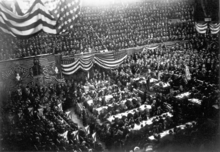
Washburne left France when Grant's term ended in 1877. He returned to Galena. When Grant decided to run for an unusual third term in 1880, Washburne agreed to support him. He even told his own supporters not to try to make him a candidate.
Despite this, Washburne was still considered a candidate at the 1880 Republican National Convention in Chicago. To win the nomination, 379 votes were needed. Washburne consistently received 30 to 40 votes from delegates. Grant was the early favorite, getting between 300 and 315 votes.
After more than 30 votes, it became clear that neither Grant nor the other main candidates, James G. Blaine and John Sherman, could win. Delegates started looking for a new, unexpected candidate. On the 34th vote, 16 Washburne delegates from Wisconsin suddenly voted for James A. Garfield. This surprise action led to a surge of support for Garfield. He was nominated on the 36th vote.
Most of Grant's delegates stayed loyal, even as others switched to Garfield. Grant was angry with Washburne. He believed Washburne had not fully supported his campaign as promised. Grant thought if Washburne's delegates had switched to him, he might have won. Washburne, however, believed that if Grant had given up, he, not Garfield, might have been the surprise candidate. Grant and Washburne never met again, and their friendship ended.
Later Years and Death
In 1882, Washburne published a book about former Illinois governor Edward Coles. Coles was an anti-slavery Virginian who had freed his enslaved people. Washburne later moved to Chicago. He served as president of the Chicago Historical Society from 1884 to 1887. In 1887, he published his own memoir, Recollections of a Minister to France.
Washburne died at his son Hempstead's home in Chicago on October 22, 1887. He had been ill for two weeks with a heart problem. His wife had passed away just a few months earlier. He was buried at Greenwood Cemetery in Galena.
Personal Traits
Washburne was a tall, broad-shouldered man with light gray eyes. People respected him for his honesty and serious nature. When he moved to Galena, Washburne promised himself he would not drink, smoke, play cards, or go to the theater. After marrying Adele Gratiot in 1845, he started drinking one glass of wine with dinner.
Family Connections
Three of Washburne's brothers also became politicians: Cadwallader C. Washburn, William D. Washburn, and Israel Washburn, Jr.. His son, Hempstead Washburne, served as the 32nd Mayor of Chicago from 1891 to 1893.
Honors and Legacy
In 1885, Washburne received an honorary degree of Doctor of Law (LL.D.) from Bowdoin College.
Washburne Avenue at 1232 South in Chicago is named in honor of Elihu Washburne.
See also
 In Spanish: Elihu B. Washburne para niños
In Spanish: Elihu B. Washburne para niños
 | Anna J. Cooper |
 | Mary McLeod Bethune |
 | Lillie Mae Bradford |


